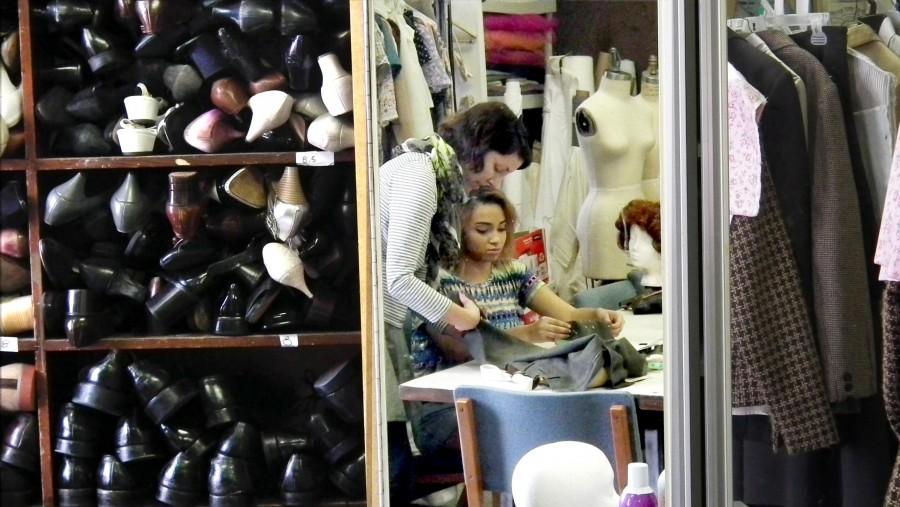Despite being one of two departments to increase enrollment this year, the department of theatre arts and dance is feeling the effects of salary cuts and reductions in hours.
Meredith Hartley, director of public affairs, said that some staff members received a change in workable hours, taking them from full-time status of 37 hours a week to 30. These cuts resulted in an income decrease of approximately 19 percent for staff members.
Other staff members received contract changes, cutting year-round contracts to 10-month contracts and resulting in pay cuts of roughly 17 percent, Hartley said.
In “a few cases,” the same employee faced both cuts, Hartley said.
The department of theatre arts and dance is not the only department facing these cuts, Hartley said.
“It isn’t just the theatre department. They are just the ones being the most vocal about it,” Hartley said.
These new cuts, combined with layoffs and a voluntary severance program, have effectively balanced the budget and closed the university’s $7.5 million deficit, which was caused by an enrollment shortfall for the 2013-2014 academic year.
The department of theatre arts and dance currently operates with seven full-time employees. Two of its staff members received notice of salary cuts, while another received both salary and contract changes. The changes will take immediate effect on Monday, Feb. 24.
Kellie Grengs, costume director, is one of the staff members facing cuts. The other two affected staff members are Robert Self, theatre technical director, and Margaret “Amelia” McCarthy, the department’s office manager.
“All three staff members in the school’s theater program, housed in the College of Music and Fine Arts, were forced to cut their hours,” Grengs said.
Self said he received a reduction from 36 to 30 hours per week. This reduction also lowers his base salary by 20 percent, putting it at the same amount he received in 2006, he said.
“Imagine yourself making today what you made over eight years ago,” Self said.
Self also teaches courses in set construction and other aspects of theatrical design. He said that he is concerned that these practical skills are not receiving proper consideration in the face of these cuts.
“I am troubled by the concept that the actual hands-on aspect of producing theatre is considered to be a non-academic aspect of a degree program in the department of theatre arts and dance,” Self said. “The ability of any degree program to transition from concept to practice is crucial in my mind.”
While employees within the department said that cuts were preferable to layoffs simply due to the size of the department, there is now a question of whether they will choose to keep their jobs at the lowered pay rate.
“I have had two companies contact me to explore possible full-time job openings, but I have currently opted for a slower approach. Unfortunately, I must consider all options,” Self said.
Grengs said that while these cuts and an “extremely hostile work environment” have forced her to consider other options, she is concerned about the impact any staff member’s departure could have on students.
“Essentially, I could put in my two weeks notice and the Provost states that ‘no faculty will be impacted and the students won’t be impacted.’ However, there will be a tremendous impact,” Grengs said. “I just don’t think the administration cares, because this really wasn’t clearly thought through. The cuts were not equitable across the board in our college.”
With the technical and costume directors being two of the staff members facing these cuts, Grengs said that the department has been informed that the quality of its program will be affected.
“The dean has said that our quality will be impacted and the quality of productions that we can produce here will be impacted,” Grengs said.
Of the reported 14 total staff members who face these changes, the College of Music and Fine Arts houses eight, according to a letter released by the college’s dean, Donald Boomgaarden.
Self said that some of his main frustrations stemmed from an apparent lack of communication between the administration and the affected employees.
“It appears I was naive in thinking that the cuts would be made after careful consideration of each position, based upon the impact it would have on students in the affected department,” Self said. “Fr. Wildes stated in his PR response letter to the press that there would be no adverse academic impact on the students. Somewhere somebody forgot to find out what the production staff of a theater company/department does.”
Hartley said that no additional statements would be made regarding the cuts within the College of Music and Fine Arts.
“We are letting Boomgaarden’s letter, which clearly addresses the problem in terms of the College of Music and Fine Arts, speak at this time,” Hartley said.
Lauren Patton may be reached at [email protected]






